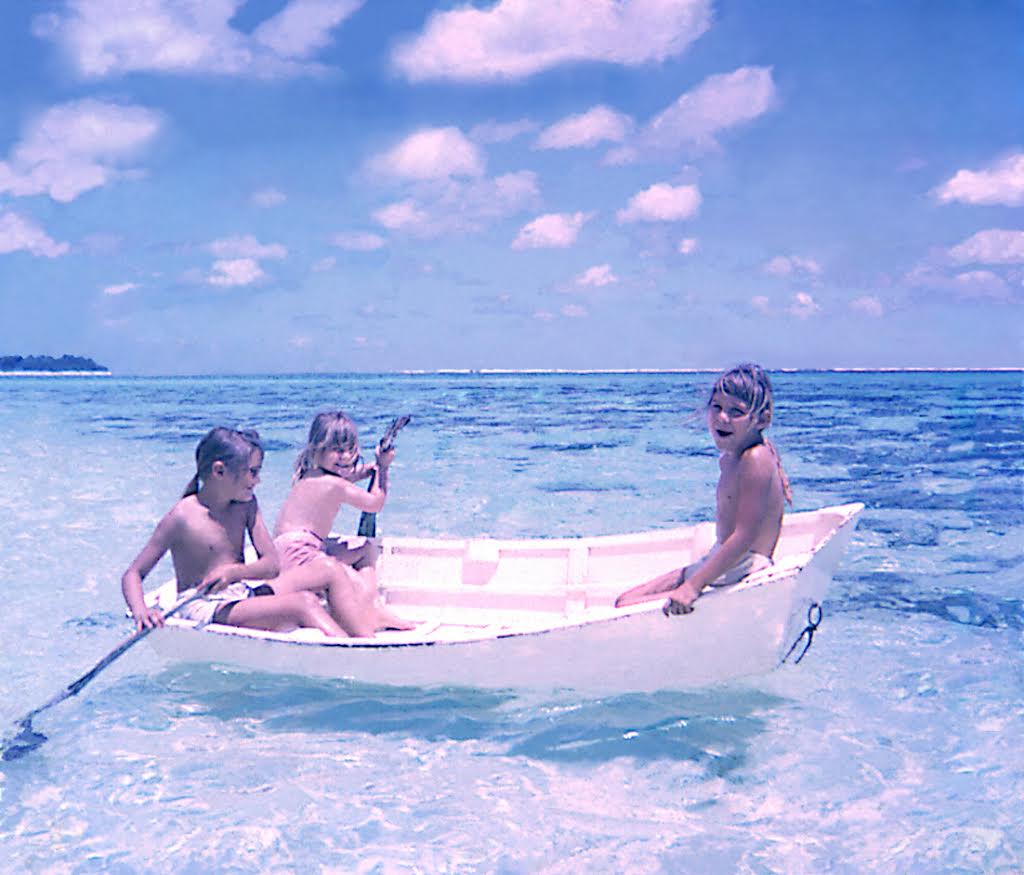Te Ipukarea Society : ‘We can’t go back, but we can look back and learn’
Saturday 22 July 2023 | Written by Te Ipukarea Society | Published in Environment, National

Steerer Rosalyn, powerhouse and author June and caller Diane in Muri Lagoon in 1969. SUPPLIED/ 23072125
This week’s environmental column was written by Te Ipukarea Society executive member June Hosking. Te Ipukarea Society is a non-government environmental group established in 1996.
When I was a young girl in the 1960s, Rarotonga’s lagoon was our playground in paradise.
Muri Beach was a wide sandy area where horse races took place.
Andrew’s late Uncle Sonny recalled with much excitement, racing from Muri to Paringaru, then carrying on through the stream to head home.
I searched horse racing photos online recently, just to check my memory.
Photographs show even more horses than I recall, racing side by side.
There's not enough clear sand to attempt that now.
In 1970 we moved to Fiji for dad’s job and 16 years passed before I was able to see Rarotonga again.
The first few days in Rarotonga I was in disbelief.
What came to mind was the song my oldest sister Rosalyn wrote all those years back.
“Raro will no longer be a peaceful island on the sea, trucks and cars will fill our land and problems will be at hand...”
An 11-year-old child correctly predicted the future.
I'm not ashamed to say, I cried that first week back in Raro.
More recently I asked what happened to the broad stretch of white sand in Muri and was told that truck loads were taken for the airport development.
Too much for nature to replace in a hurry.
In the early 1970s, a scientific report stated Muri had fragile ecosystems, and recommended it be kept as a place to visit and enjoy, but not a place for tourist accommodation.
Imagine how different Muri would be today if that report had been taken seriously.
Millions of dollars have been spent in trying to slow down the degeneration of the lagoon, to no avail.
Unfortunately, it seems the lure of money speaks loudest.
At the Cook Islands Careers Expo in June 2023, I felt like David facing four pro-mining rich Goliaths with booths well-staffed, giveaways, extra tables and chairs for visitors, large screen and sounds, while our Te Ipukarea Society booth, run by two volunteers and one staff member, showed videos on a laptop with a small speaker.
We are already starting to see pro-mining money being put into our community through sports teams and art studio sponsorships, and now they are (one of the) major sponsor for our most iconic annual culture festival Te Maeva Nui.
No doubt everyone loves a bit of money, but not all things which glitter are gold.
Is our country selling our soul to big business?
It’s a good thing I know how the David and Goliath battle went, so I continue to speak boldly from the heart.
As the saying goes, “they don't care how much you know until they know how much you care”.
I know a number of the people staffing the neighbouring seabed mining booth, and am sure they care about our Marae Moana as much as I do.
But when push comes to shove, how much sway will they have?
If they see that deep sea mining isn't such a good idea after all, will the powers that be listen to their recommendations to pull out?
Will the government have the courage to reveal the whole truth of findings from seabed exploration?
If findings show that mining will cause irreparable damage to ecosystems, will the government have the conviction to say no to deep sea mining?
Sadly, we can't go back to those days of wide white sand beaches and thriving lagoons, but we can look back and learn from ours and others mistakes.















































